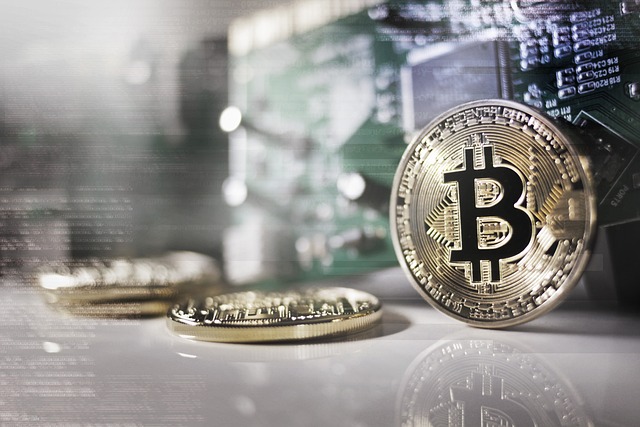Crypto Banking and DeFi in [Year]: What to Expect
Crypto Banking and DeFi in [Year]: What to Expect

The Rise of Crypto Banking: A Game-Changer for Traditional Finance
The rise of crypto banking has emerged as a truly disruptive force in the realm of traditional finance. With the advent of cryptocurrencies, financial transactions are no longer bound by the limitations of traditional banking systems. This new wave of digital currencies has fundamentally changed the way we view and interact with money. Crypto banking offers users a decentralized, secure, and transparent way to store, transfer, and invest their assets. Gone are the days of relying solely on centralized banks and intermediaries. Instead, individuals can now take control of their finances, free from the constraints and fees imposed by traditional financial institutions.
Moreover, crypto banking has opened up a whole new world of opportunities for financial inclusion. In many developing countries and underserved communities, access to banking services remains a significant challenge. However, with crypto banking, individuals can now bypass the traditional banking system and have immediate access to financial services on a global scale. This has the potential to empower millions of people who were previously excluded from the formal financial system, enabling them to participate fully in the global economy. The rise of crypto banking has truly leveled the playing field, as anyone with an internet connection can now become their own bank and have control over their financial destiny.
Exploring the Potential of DeFi: Decentralized Finance on the Horizon
Decentralized Finance, or DeFi, has emerged as one of the most exciting and promising sectors within the crypto industry. By leveraging blockchain technology, DeFi aims to decentralize and democratize traditional financial services.

The potential of DeFi is immense. Through smart contracts, which are self-executing contracts with the terms of the agreement directly written into code, DeFi platforms enable automated and transparent financial transactions. This not only reduces the need for trust between parties but also minimizes the risk of fraud and manipulation. Moreover, DeFi allows for global financial inclusion, as it removes barriers such as geographical boundaries and costly fees associated with traditional banking. With DeFi, individuals in underserved regions can now have access to financial services that were previously inaccessible to them, paving the way for greater economic empowerment and financial freedom. As the DeFi ecosystem continues to evolve and mature, it is likely to revolutionize the way we think about and engage with finance, bringing about a truly decentralized and inclusive financial system.
How Crypto Banking and DeFi are Revolutionizing Financial Inclusion
Financial inclusion, once a distant dream for many, is now becoming a reality thanks to the rise of crypto banking and DeFi. These innovative technologies are leveling the playing field by empowering individuals who have been excluded from traditional financial systems. With crypto banking, anyone with a smartphone can now access a range of financial services, such as making payments, sending and receiving money, and even borrowing and lending, without the need for a traditional bank account. This opens up a world of possibilities for the unbanked and underbanked populations, who can now participate in the global economy and improve their financial well-being.
DeFi, or decentralized finance, takes financial inclusion a step further by removing intermediaries and enabling peer-to-peer financial transactions. Through smart contracts and blockchain technology, individuals can securely interact with the DeFi ecosystem, bypassing the need for intermediaries such as banks or government institutions. This disintermediation not only reduces costs and transaction times but also eliminates the need for trust in traditional financial systems. By providing access to a diverse range of financial services, including savings, loans, investments, and insurance, DeFi is empowering individuals to take control of their own financial futures and break free from the constraints imposed by traditional finance.
Financial inclusion is essential for achieving economic growth and reducing poverty globally. The revolution brought by crypto banking and DeFi is not just about convenience or efficiency; it is about creating equal opportunities and addressing the deep-rooted disparities that have held back millions of people. While challenges and risks remain, the potential of these disruptive technologies to transform the landscape of financial inclusion is undeniable. The future holds great promise, as more individuals gain access to the benefits of crypto banking and DeFi, allowing them to break free from the barriers that have long hindered their financial freedom.
Unleashing the Power of Smart Contracts in Crypto Banking and DeFi
Smart contracts have emerged as a powerful tool in the realm of crypto banking and decentralized finance (DeFi). These self-executing contracts are built on blockchain technology, enabling the automation of transactions without the need for intermediaries. By removing the reliance on traditional institutions, smart contracts offer increased transparency and efficiency in financial processes.
One of the key advantages of smart contracts is their ability to enforce predetermined conditions and rules. These contracts are programmed to execute only when certain conditions are met, ensuring that all parties involved are bound by the agreed upon terms. This eliminates the need for intermediaries such as banks or lawyers to oversee and validate transactions, reducing both time and costs. Additionally, smart contracts enable faster settlement times, as the verification process is automated, resulting in near-instantaneous execution. Their versatility allows smart contracts to be used in a myriad of financial use cases, including lending, insurance, and asset tokenization. Overall, the incorporation of smart contracts in crypto banking and DeFi is revolutionizing the way financial transactions are conducted, providing increased security, efficiency, and accessibility to users.
The Role of Stablecoins in Crypto Banking and DeFi Ecosystems
Stablecoins play a crucial role in the ever-expanding world of crypto banking and decentralized finance (DeFi) ecosystems. These digital currencies are designed to maintain a stable value by being pegged to a reserve asset, such as a fiat currency like the US dollar. By offering stability amidst the volatility of cryptocurrencies, stablecoins provide users with a more reliable medium of exchange and store of value.
One of the primary use cases for stablecoins in crypto banking and DeFi is facilitating seamless cross-border transactions. Traditional fiat transfers can be time-consuming, costly, and subject to various intermediaries. However, stablecoins enable individuals and businesses to swiftly transfer funds across different borders without the need for traditional financial institutions. This not only reduces transaction fees but also eliminates unnecessary delays, making international payments quicker and more accessible to a broader range of users. Additionally, stablecoins offer a degree of privacy in these transactions, as the blockchain technology behind them ensures transparency while preserving user anonymity.
Navigating the Risks and Security Challenges in Crypto Banking and DeFi
Cryptocurrency banking and decentralized finance (DeFi) have undoubtedly revolutionized the financial landscape, but they are not without their risks and security challenges. One of the primary concerns in the crypto banking and DeFi space is the issue of hacking and theft. As digital assets are stored in online wallets and smart contracts, they become targets for cybercriminals who seek to exploit vulnerabilities in the system. This poses a significant risk to both individual users and financial institutions alike.
To navigate these risks, it is crucial for investors and users to prioritize security measures. Implementing strong passwords, enabling two-factor authentication, and regularly updating software are simple yet effective ways to protect digital assets. Additionally, it is essential to conduct thorough research and due diligence before engaging with any crypto banking or DeFi platform.

Regulatory Developments and the Future of Crypto Banking and DeFi
Regulatory developments play a crucial role in shaping the future of crypto banking and decentralized finance (DeFi). As these innovative technologies continue to gain traction, policymakers and regulators are faced with the challenge of adapting existing frameworks or creating new ones to ensure a safe and transparent operating environment. The evolving landscape of regulations will significantly impact the growth and adoption of crypto banking and DeFi, bringing legal clarity and investor protection to this rapidly expanding sector.
However, striking the right balance between regulation and innovation is no easy task. While some argue that stringent regulations could stifle the potential of crypto banking and DeFi, others believe that clear guidelines are necessary to maintain market integrity and prevent financial risks. As the future unfolds, it is crucial for regulators to foster an environment that encourages innovation while safeguarding against potential vulnerabilities, such as money laundering, fraud, and market manipulation. Finding the right regulatory approach is essential to unlocking the full potential of crypto banking and DeFi and allowing them to flourish in a secure and regulated manner.
The Integration of Artificial Intelligence and Machine Learning in Crypto Banking and DeFi Services
As the world of finance continues to evolve, the integration of artificial intelligence (AI) and machine learning (ML) is poised to revolutionize the realm of crypto banking and decentralized finance (DeFi) services. With their ability to analyze vast amounts of data and make intelligent predictions, AI and ML technologies have the potential to streamline processes, enhance security, and drive innovation within the crypto banking and DeFi ecosystems.
One area where AI and ML can bring significant value is in risk management and fraud detection. By constantly monitoring transactions and patterns, these technologies are able to identify suspicious activities and swiftly alert users and platforms. This not only helps in ensuring the security of funds but also instills trust in the crypto banking and DeFi systems. Additionally, AI and ML algorithms can analyze market trends, predict price movements, and provide valuable insights to investors, enabling them to make informed decisions and potentially unlock new investment opportunities. With the integration of AI and ML in crypto banking and DeFi services, we can expect a more efficient and user-friendly financial landscape, empowering individuals and businesses to take advantage of the benefits that these technologies bring.
Unlocking New Investment Opportunities with Crypto Banking and DeFi
Crypto banking and decentralized finance (DeFi) have opened up a whole new world of investment opportunities, revolutionizing traditional financial systems. With the introduction of blockchain technology, individuals can now participate in a wide range of investment activities, previously accessible only to institutional investors or high net worth individuals. This democratization of finance has created a level playing field, where anyone with an internet connection can engage in various investment options and potentially generate significant returns.
One of the key advantages of crypto banking and DeFi is the ability to access a diverse range of investment products. From traditional assets like stocks and bonds to digital assets such as cryptocurrencies and digital tokens, investors have a plethora of options to choose from. This wide selection enables investors to create a diversified portfolio, spreading their risk across different asset classes. Additionally, the transparent nature of blockchain technology provides investors with real-time information and visibility into their investments, enhancing trust and confidence in the system.
Moreover, crypto banking and DeFi have introduced innovative investment instruments, such as decentralized exchanges (DEXs) and liquidity pools.

The Road Ahead: Predictions and Trends for Crypto Banking and DeFi in [Year]
The future of crypto banking and decentralized finance (DeFi) looks promising as we head into [Year]. With the increasing adoption and mainstream recognition of cryptocurrencies, we can expect to see a surge in the number of people relying on these digital assets for their financial needs. This will not only revolutionize traditional finance but also provide individuals with more autonomy over their money and financial decisions.
One of the key trends we can anticipate in [Year] is the integration of blockchain technology with other emerging technologies such as Internet of Things (IoT) and artificial intelligence (AI). This convergence will pave the way for innovative solutions in the realm of crypto banking and DeFi, enabling seamless and efficient transactions, as well as advanced risk management tools. Additionally, we can expect the development of user-friendly platforms and applications that make it easier for individuals to participate in the crypto ecosystem, further fostering financial inclusion. As we embark on this exciting journey, it will be crucial to address the regulatory challenges and security concerns to ensure a safe and thriving environment for crypto banking and DeFi.
What is crypto banking?
Crypto banking refers to the use of cryptocurrency and blockchain technology in traditional banking services, such as payments, lending, and savings. It allows individuals to manage their finances using digital currencies instead of traditional fiat currencies.
How is crypto banking different from traditional banking?
Crypto banking differs from traditional banking in that it operates on a decentralized network, using blockchain technology. This means that transactions are verified and recorded by a network of computers, rather than a centralized authority like a bank. Additionally, crypto banking offers increased security, transparency, and the potential for faster and cheaper transactions.
What is DeFi?
DeFi, or Decentralized Finance, is a term used to describe financial applications that are built on blockchain technology. These applications aim to provide traditional financial services, such as lending, borrowing, and trading, in a decentralized and transparent manner, without the need for intermediaries like banks.
How is DeFi different from traditional finance?
DeFi differs from traditional finance in that it removes the need for intermediaries, such as banks or brokers, by utilizing smart contracts on blockchain platforms. This allows for peer-to-peer transactions, increased accessibility, and potentially lower fees.
How does crypto banking and DeFi revolutionize financial inclusion?
Crypto banking and DeFi have the potential to revolutionize financial inclusion by providing access to financial services for individuals who are unbanked or underbanked. With crypto banking, anyone with internet access can participate in the financial system, and DeFi allows for permissionless access to a wide range of financial services without the need for a traditional bank account.
What are stablecoins and how do they impact crypto banking and DeFi?
Stablecoins are cryptocurrencies that are pegged to the value of a stable asset, such as a fiat currency or a commodity. They provide stability in the volatile crypto market and are often used as a medium of exchange in crypto banking and DeFi. Stablecoins enable users to transact and store value more securely, while also reducing the volatility associated with other cryptocurrencies.
What are the risks and security challenges associated with crypto banking and DeFi?
Crypto banking and DeFi come with their own set of risks and security challenges. These include the potential for hacking, scams, smart contract vulnerabilities, and regulatory uncertainties. It is important for users to exercise caution, conduct thorough research, and follow best security practices to mitigate these risks.
How do regulatory developments impact the future of crypto banking and DeFi?
Regulatory developments play a crucial role in shaping the future of crypto banking and DeFi. As governments and regulatory bodies worldwide develop frameworks and guidelines for cryptocurrencies and blockchain technology, they will have a significant impact on the adoption and growth of these sectors. Clear and favorable regulations can encourage innovation, while overly restrictive regulations can stifle the industry’s potential.
How does artificial intelligence and machine learning integrate into crypto banking and DeFi?
Artificial intelligence and machine learning technologies can be integrated into crypto banking and DeFi services to enhance efficiency, automation, and risk management. These technologies can be used for tasks such as fraud detection, credit scoring, portfolio optimization, and market analysis, providing users with more personalized and intelligent financial services.
What new investment opportunities does crypto banking and DeFi unlock?
Crypto banking and DeFi unlock a range of new investment opportunities, such as decentralized lending and borrowing, yield farming, liquidity mining, and tokenized assets. These opportunities allow individuals to earn passive income, diversify their investment portfolios, and participate in the growing digital economy.
Todays Featured Product:
Buy, exchange and grow your crypto securely with a Ledger hardware wallet, combined with the Ledger Live app. It’s never been easier to keep your crypto safe and accessible. Buy direct from Ledger.com and get todays Special Offers Here.




